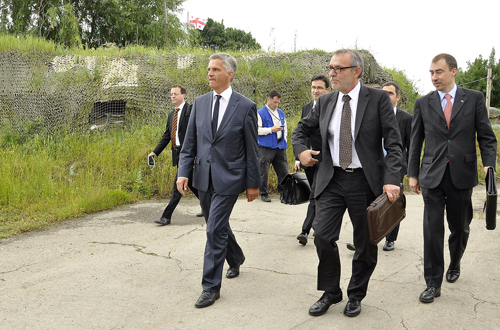| OSCE, Conflicts, Bilateral Ties Discussed During Swiss President's Visit |
| Civil Georgia, Tbilisi / 3 Jun.'14 / 23:16 |

From left to right: Swiss President and Foreign Minister Didier Burkhalter; Swiss OSCE chairmanship’s special representative for South Caucasus, Ambassador Angelo Gnädinger, and Head of EU Monitoring Mission in Georgia Toivo Klaar in the village of Ergneti on the administrative boundary line with breakaway South Ossetia, June 3, 2014. Photo: InterPressNews
Swiss President Didier Burkhalter, whose country holds OSCE rotating chairmanship this year, held talks with the Georgian leadership on June 3 in Tbilisi, which he visited as part of his trip to three South Caucasus countries.
In his capacity as OSCE chairperson, Burkhalter, who also serves as the Swiss foreign minister, discussed issues related to Abkhaz and South Ossetian conflicts, as well as proposals on how to restore OSCE presence in Georgia.
OSCE mission had to end its operation in Georgia in June, 2009 after a failure to agree on its mandate following Russia’s recognition of Georgia’s breakaway regions. At the time Russia rejected a proposal by then OSCE chairmanship, Greece, which was based on the so called “status-neutral” formula making no mention of Georgia or its breakaway regions in order to avoid dispute over the status.
Speaking at a news conference after meeting President Giorgi Margvelashvili, the Swiss President said that Swiss OSCE chairmanship’s one of the key directions in respect of Georgia is “giving importance” to finding a solution to restoration of OSCE presence in Georgia through which, he said, it will be possible to better address priories such as “improving and stabilizing security situation” and addressing humanitarian needs of population of conflict-affected areas.
He said that the proposal involves setting up of “a mobile support team operational” from OSCE headquarters in Vienna.
Burkhalter said mandate has yet to be discussed and agreed between the “different parties”.
“We work very strong on it; I can’t give more details for time being,” Burkhalter said.
Georgian Foreign Minister, Maia Panjikidze, said that although the issue was on the agenda of talks with the Swiss President, it is too early now to say “what kind of mission it might be or whether there will be any mission at all.”
One of the options, she said, is a Vienna-based mobile support team, which can pay fact-finding missions on the ground.
“But it’s not so easy to arrange,” Panjikidze said.
When outlining the Swiss OSCE chairmanship’s priorities, Burkhalter said in January that his country will be “ready to re-launch a discussion on the OSCE presence in Georgia, provided that the stakeholders show flexibility and creativity regarding the institutional setup of the OSCE presence.”
Together with the EU and UN, OSCE acts as a co-chair of the Geneva international discussions, launched after the August 2008 war. Earlier on June 3 the Swiss President visited Ergneti on the administrative boundary line with breakaway South Ossetia and met participants of Incident Prevention and Response Mechanism (IPRM), a body which gathers officials from Tbilisi, Tskhinvali, as well as Russian representatives on the ground in South Ossetia to address on regular basis everyday issues ranging from security to freedom of movement.
Burkhalter said that Swiss OSCE chairmanship is ready to facilitate “small assessment missions” from OSCE’s Conflict Prevention Centre “if wished and needed” – something that is unlikely to be accepted by the authorities from the breakaway regions.
Mediator
Switzerland has been representing Georgia's interests in Russia and Russia's interests in Georgia since the two countries cut diplomatic relations after the August 2008 war.
In 2011 Swiss mediators brokered a deal between Moscow and Tbilisi, which paved the way for Russia’s WTO accession; the deal, which has not been yet put into operation, involves provisions on putting in place sophisticated systems for cargo tracking and audit to provide international monitoring of trade and movement of cargos in Georgia’s breakaway regions of Abkhazia and South Ossetia.
Responding on the question of delay with putting this deal into operation, the Swiss President said: “We are still discussing and negotiating to find the best way of solving this case of customs problematic. We will send next week negotiating team to solve the last point. [In recent] weeks we were also expecting reaction of Georgia on some changes on the contracts.”
Bilateral Relations
On bilateral ties, the Swiss President said that relations with Georgia are “not only very friendly, but also very intensive.”
Apart of President Margvelashvili, in Tbilisi he met PM Irakli Garibashvili with whom Burkhalter signed an investment protection treaty. With Georgian foreign minister, Burkhalter signed memorandum of understanding on cooperation between the foreign ministries of Georgia and Switzerland. He also met lawmakers from ruling and opposition parties.
Switzerland has allocated CHF 41 million (about USD 45.7 million) for the period of 2013-2016 to support projects in Georgia ranging from job creation and agriculture sector to improved integration of internally displaced persons and the prevention of natural disasters
The Swiss President, who arrived in Tbilisi from the Azerbaijani capital Baku, will conclude his trip to South Caucasus with a visit to the Armenian capital Yerevan.
